This ridiculous moment for a lesbian at the doctor shows how far we still have to go
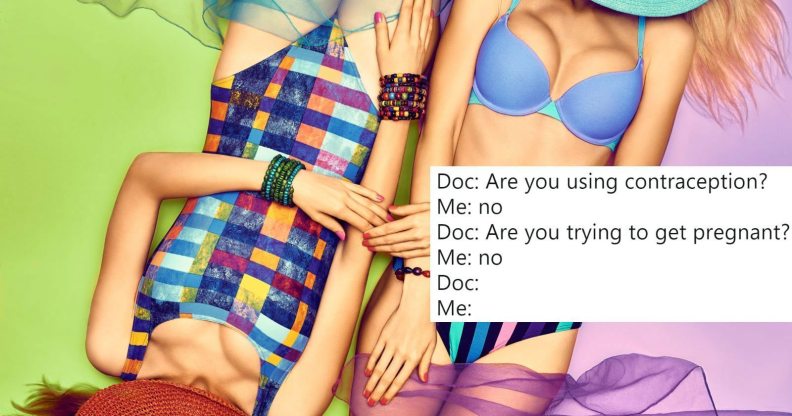
Ruth Hunt visits the doctor… (918Evgenij/Twitter)
There was some important news for lesbian, gay and bisexual people in England at the weekend.
It was announced that doctors will now ask patients about their sexual orientation.
The experience (below) of the lesbian boss of the UK’s largest LGBT charity illustrates why the doctors need to start asking about sexuality and gender identity.
Patients will be asked “Which of the following options best describes how you think of yourself?”.
The available responses are ‘Heterosexual or Straight,’ ‘Gay or Lesbian,’ ‘Bisexual,’ ‘Other’ and ‘Don’t Know’.
Patients are free to decline to answer, and in these cases their sexuality will be listed as ‘Not Stated’.
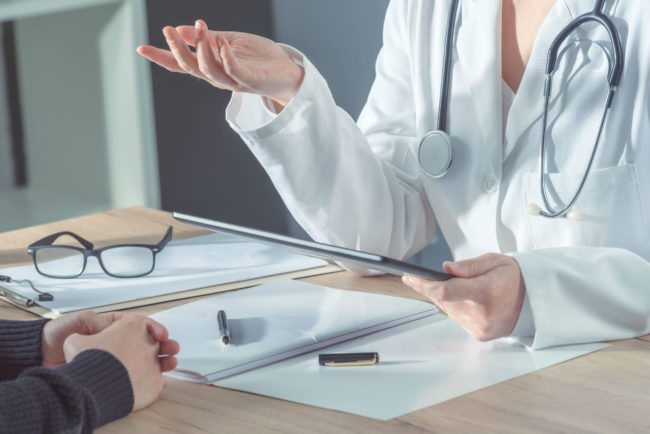
A doctor talks to her patient (stevanovicigor)
The idea is that with this information, doctors will be better able to treat all patients equally, and also be better informed to assess risk factors and treatment options.
Related: LGBT campaigners call for doctors to ask if patients are transgender
The move has been welcomed by some, if not all, LGBT groups.
Among those supporting the decision was LGBT charity Stonewall.
A spokesperson for the group said: “It’s vital sexual orientation is considered in health assessments.
“It can help GPs and other staff identify and recognise the unique health issues lesbian, gay and bi people may face.”
They continued: “We have been calling for sexual orientation to be considered as other protected characteristics for over a decade.
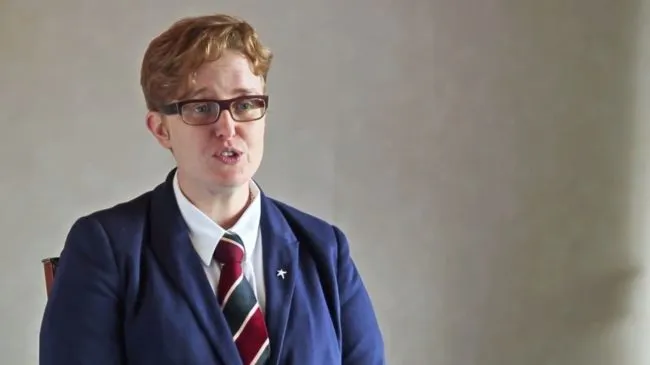
Stonewall CEO Ruth Hunt
“This move will also help health services gather evidence on and understand the needs of LGB people.”
But if the experience of the charity’s own chief executive Ruth Hunt is typical, it seems that doctors have a long way to go before they’re using the information they’re already being given.
She revealed what happened when her doctor quizzed her on her sex life at an appointment, and the bizarre response she received.
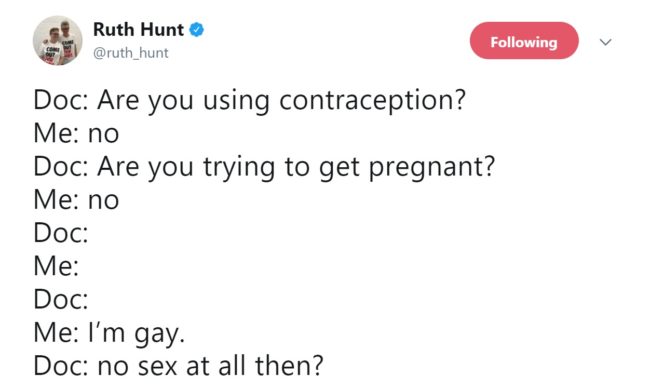
Ruth Hunt’s tweet about her doctor (Twitter)
There was more, too.
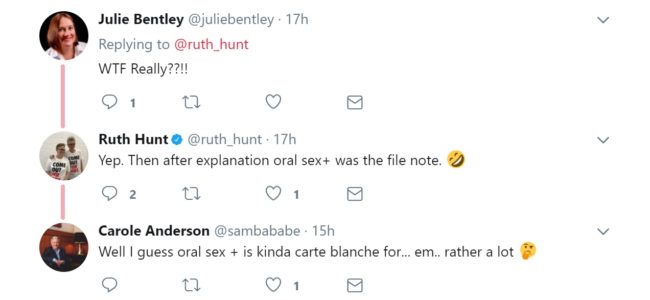
And then things got more odd (Twitter)
And the Stonewall boss wasn’t the only one.
She retweeted the experiences of several of her followers who had heard similarly ill-informed comments from their own doctors.
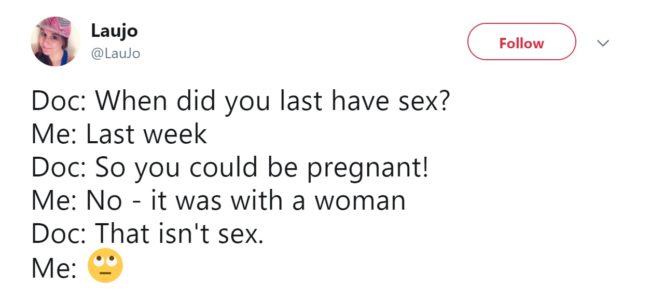
Other people had similar experiences (Twitter)
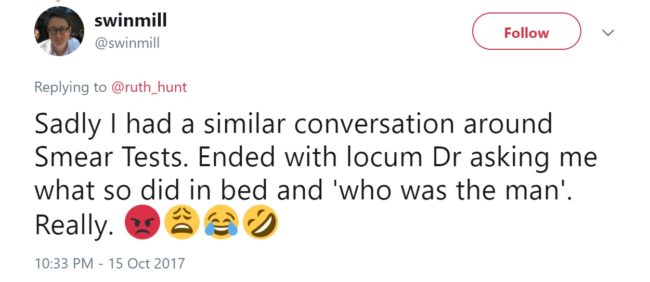
“Who was the man?” (Twitter)
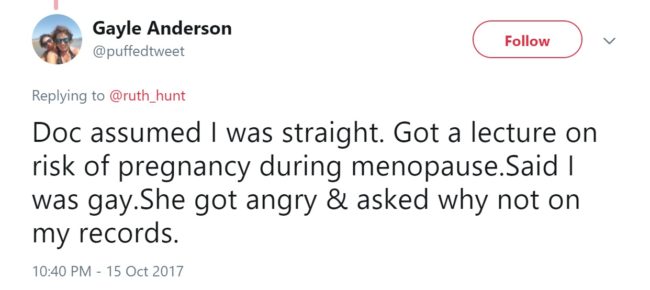
Doctor’s assumptions (Twitter)
Not that long ago, PinkNews published a guide called “How do lesbians have sex?”.
We knew at the time that it wasn’t the sort of question that people who don’t identify as lesbians would have that much trouble answering if they just thought about it for a few moments.
But we also knew that it was a question asked on the internet with alarming regularity.
Related: These 13 stock photos get lesbian sex very very wrong
The NHS’s new guidelines come into place from April 2019, for patients aged 16 and over.
The guide applies to doctors and nurses, as well as local councils that are responsible adult social care.
It advises the question be asked every time a patient is face-to-face with the healthcare professional if their sexual orientation isn’t already on file.
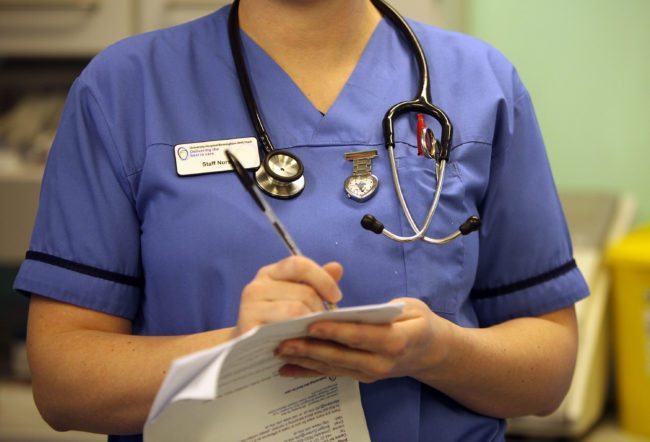
An NHS Nurse (Christopher Furlong/Getty Images)
NHS England said its hope was that by recording the data it could “ensure that no patient is discriminated against,” as health bodies are required to under the Equality Act.
A spokeswoman said collecting the data would “have no impact on the care [people] receive,” other than helping to make sure patients are being treated equally.
When it comes to the NHS, great strides are being made with regards to the treatment of LGBT people.
Earlier this month, the NHS’s large-scale, three-month trial of Pre-Exposure Prophylaxis (PrEP) drug Truvada was launched.
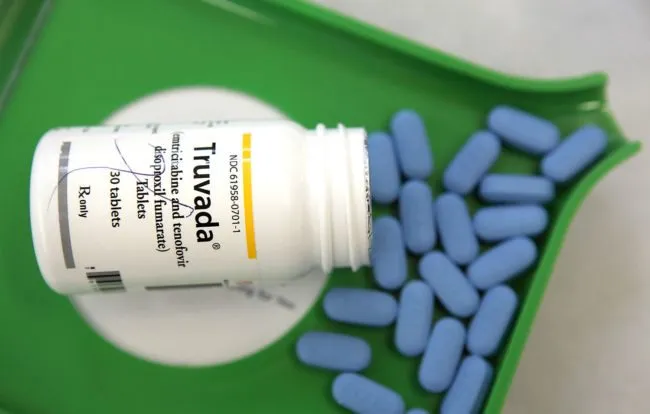
Truvada
“The trial is a pragmatic health technology assessment of PrEP and its implementation, that is, it aims to answer the key questions under real-world conditions and at sufficient scale,” read the website for the IMPACT trial.
“In addition, the new trial will assess the impact of PrEP on new HIV diagnoses and sexually transmitted infections.
“The results will inform service commissioners (funders) on how to support clinical and cost-effective PrEP access in the future.”
The drug, which can drastically reduce people’s chances of being infected with HIV, will be made available for free on the NHS as part of the trial.
Meanwhile, the usual suspects are not all pleased with the progressive moves being made by the NHS when it comes to treating LGBT people.
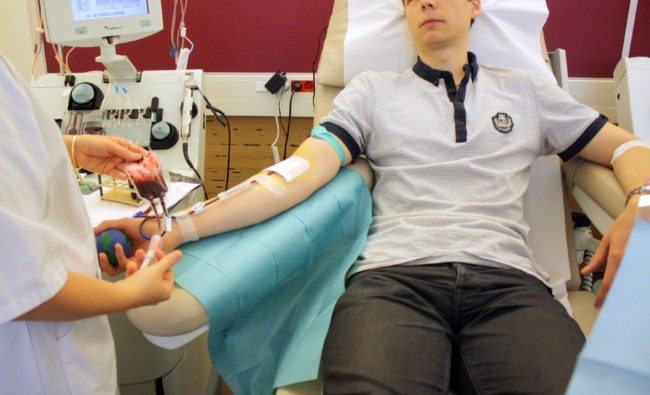
A blood donor (Ana Arevalo/AFP/Getty Images)
UKIP councillor Nigel Pearson, from Chard North in Somerset, claimed in a leaflet that non-LGBT people were left “feeling put out” by the attention given to lesbian, gay, bisexual and transgender people.
“I’m sure there are a number of LGBT people out there who are passionate about this,” he said,
“But there are other people who will feel put out and will want to know what this money was used for.”
As well as pinning the blame of the NHS crisis on LGBT services, the leaflet said that the national shortage of NHS doctors was due to “too many women being hired” in an act of “positive discrimination”.
He added that the NHS should “set a quota for female doctors, so we don’t train so many female doctors and instead train more men”.

